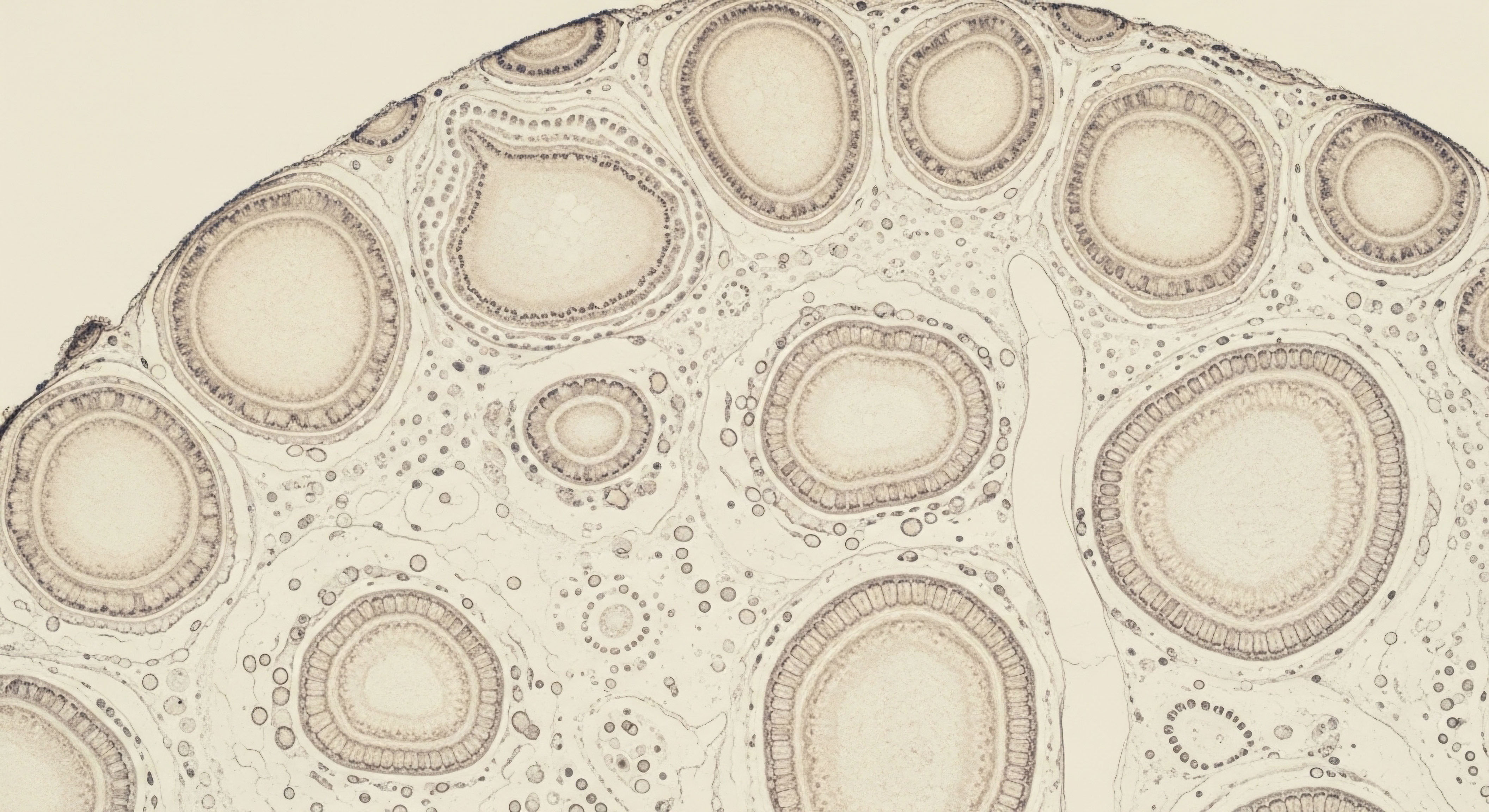

Fundamentals
Your sense of mental sharpness, the ease with which you recall a name or a fact, is intimately tied to the complex hormonal symphony playing out within your body. When we speak of androgens, like testosterone, we are discussing powerful signaling molecules that do far more than define secondary sex characteristics; they are fundamental architects of your neural landscape.
The brain is a primary target for these hormones, which are synthesized not only in the gonads and adrenal glands but within the brain itself. They act directly on neurons to modulate neuroplasticity, the very mechanism that allows your brain to learn, adapt, and form memories.
This process is dynamic, a constant state of remodeling that underpins your cognitive function. You may have noticed subtle shifts in your mental acuity, a change in your ability to focus or a slowing of verbal recall. These experiences are valid and often have a biological basis.
Understanding the influence of androgens on your brain’s structure and function is the first step toward comprehending these changes. It is a journey into your own biology, a personal exploration of the systems that dictate how you think and feel.

The Architecture of Cognition
The brain’s capacity for change, its plasticity, is the biological basis of all learning and memory. Androgens are key regulators of this process. They influence the growth and complexity of neurons, particularly in regions critical for cognitive tasks, such as the hippocampus. Think of your neurons as trees, with intricate branches, or dendrites, that receive information.
At the ends of these branches are dendritic spines, tiny structures that form synapses, the communication points between neurons. Androgens promote the formation and stability of these spines, effectively strengthening the connections within your neural network. When androgen levels are optimal, this network is robust and efficient, facilitating rapid communication between different brain regions.
This translates to better verbal and spatial memory, enhanced problem-solving abilities, and a general sense of mental clarity. A decline in androgen levels, whether due to aging or medical intervention, can lead to a reduction in this synaptic density, potentially impairing cognitive performance.

Androgens and Neurotransmitters
Beyond their structural role, androgens also modulate the activity of neurotransmitters, the chemical messengers that carry signals across synapses. They influence the release and reception of key neurotransmitters like acetylcholine, which is vital for memory and learning, and dopamine, which is associated with motivation and executive function.
By fine-tuning these neurochemical systems, androgens help to maintain a state of cognitive readiness. They also interact with other hormonal systems, including the estrogen system. Testosterone can be converted into estradiol in the brain, a process known as aromatization.
This locally produced estrogen also has potent neuroprotective and neuroplastic effects, highlighting the intricate interplay of different hormonal pathways in maintaining brain health. The cognitive effects of androgens are therefore a result of a complex, multi-faceted process involving structural changes, neurochemical modulation, and hormonal synergy.
Androgens are not just male hormones; they are critical modulators of brain structure and function in both sexes, influencing everything from memory to mood.
The experience of cognitive change is often unsettling, creating a sense of disconnect from one’s own mental capabilities. This feeling is a valid and important signal from your body. It is an invitation to look deeper into the biological systems that govern your health.
The gradual decline in testosterone that occurs with age in men, for example, has been correlated with reduced performance on verbal and spatial memory tasks. Similarly, women experiencing hormonal shifts during perimenopause and menopause may notice changes in their cognitive function. These experiences are not imagined; they are the subjective manifestation of objective biological changes.
By understanding the science behind these changes, you can begin to reframe your experience, moving from a place of concern to one of empowered knowledge. This understanding is the foundation upon which a personalized wellness protocol can be built, one that addresses your unique biochemistry and supports your cognitive vitality.


Intermediate
For individuals undergoing Androgen Deprivation Therapy (ADT) for prostate cancer, the conversation around cognitive function becomes particularly salient. ADT is a cornerstone of treatment for advanced prostate cancer, designed to lower testosterone levels and inhibit tumor growth. However, by its very nature, this therapy induces a state of hypogonadism, which can have significant and widespread effects on the body, including the brain.
Patients on ADT often report a constellation of symptoms that extend beyond the physical, including difficulties with memory, processing speed, and executive function. These are not vague complaints; they are the clinical manifestation of androgen withdrawal on a brain that is accustomed to their presence.
The resulting cognitive deficits are typically mild, but they can be distressing and impact quality of life. Understanding the specific ways in which ADT affects cognition is essential for both patients and clinicians in order to develop strategies to mitigate these effects and support brain health during treatment.

What Are the Specific Cognitive Domains Affected?
Research into the cognitive effects of ADT has identified several key domains that appear to be most vulnerable. While the pattern of impairment can vary between individuals, certain trends have emerged from clinical studies. A comprehensive review of the evidence reveals that the most consistently affected areas are:
- Visuomotor Processing Speed ∞ This refers to the speed at which you can perceive visual information and respond to it with a motor action. Patients on ADT may find that they are slower to react to visual cues, which can impact activities like driving or playing sports.
- Language Skills ∞ Verbal fluency, the ability to retrieve words from your mental lexicon, can also be affected. This might manifest as difficulty finding the right word in conversation or a general sense of being less articulate.
- Memory ∞ Both verbal and visual memory can be impacted. This could involve forgetting conversations, misplacing items, or having trouble recalling lists or instructions. Some studies have pointed to impairments in working memory, the ability to hold and manipulate information in your mind for short periods.
- Executive Function ∞ This is a broad category of higher-order cognitive processes that includes planning, problem-solving, and mental flexibility. Individuals on ADT may experience challenges with multitasking, organizing their thoughts, or adapting to new situations.

The Role of Treatment Duration and Type
A logical question that arises is whether the duration or type of anti-androgen therapy influences the severity of cognitive effects. Intuitively, one might expect that longer treatment duration would lead to more pronounced cognitive decline. However, the research on this topic has yielded inconsistent results.
Some studies suggest that the risk of cognitive impairment increases with the duration of ADT, particularly beyond 12 months, while others have found no clear association. This variability may be due to a number of factors, including differences in study design, the specific cognitive tests used, and the underlying health status of the patients.
Similarly, the question of whether newer, second-generation anti-androgens have a different cognitive side effect profile than traditional ADT is still under investigation. What is clear is that the reduction in testosterone is the primary driver of these cognitive changes, regardless of the specific agent used to achieve it.
The cognitive effects of Androgen Deprivation Therapy are a direct consequence of hormonal withdrawal and can manifest as measurable changes in processing speed, memory, and executive function.
It is important to place these findings in the proper context. The cognitive deficits associated with ADT are generally mild to moderate, and there is evidence to suggest that they are reversible upon cessation of treatment. The brain is a remarkably resilient organ, and once androgen levels are restored, it has the capacity to recover much of its previous function.
This is a critical point for patients to understand, as it can alleviate fears of permanent cognitive damage. During treatment, there are proactive steps that can be taken to support brain health. Regular physical exercise, a nutrient-dense diet, and engaging in mentally stimulating activities can all help to mitigate the cognitive side effects of ADT.
Furthermore, open communication with your healthcare provider is essential. If you are experiencing cognitive changes, it is important to report them so that they can be properly assessed and managed. This might involve a referral to a neuropsychologist for formal testing or adjustments to your treatment plan if appropriate. The goal is to create a supportive environment that acknowledges the reality of these side effects while empowering you with the tools and knowledge to navigate them effectively.
| Cognitive Domain | Description | Potential Impact on Daily Life |
|---|---|---|
| Verbal Memory | The ability to recall words, stories, and other verbal information. | Forgetting conversations, difficulty remembering names. |
| Visuospatial Skills | The ability to perceive and manipulate visual and spatial information. | Challenges with navigation, assembling objects, or judging distances. |
| Executive Function | Higher-order cognitive processes like planning, organizing, and problem-solving. | Difficulty with multitasking, managing finances, or adapting to new routines. |
| Processing Speed | The speed at which cognitive tasks can be performed. | Slower reaction times, taking longer to complete mental tasks. |


Academic
From a neurobiological standpoint, the cognitive sequelae of anti-androgen therapies represent a fascinating and complex interplay of direct hormonal action, metabolic disruption, and neuroinflammatory processes. The prevailing understanding is that androgens exert a profound and continuous influence on the structural and functional integrity of the adult brain.
Their withdrawal, as induced by treatments like ADT, sets in motion a cascade of events that can culminate in the observable cognitive deficits. At the heart of this process is the androgen receptor (AR), which is widely expressed throughout the brain, with particularly high concentrations in the hippocampus and amygdala, regions critical for memory and emotional processing.
When androgens bind to these receptors, they initiate a series of genomic and non-genomic signaling pathways that regulate everything from synaptic plasticity to cell survival. The absence of this signaling disrupts the delicate homeostatic balance of the neural environment, leading to a state of increased vulnerability.

How Do Anti Androgens Disrupt Neurosteroid Synthesis?
One of the most compelling areas of research in this field is the impact of anti-androgens on neurosteroid synthesis. Neurosteroids are a class of steroids that are synthesized de novo in the brain and have potent modulatory effects on neuronal excitability.
One of the most important of these is allopregnanolone, a metabolite of progesterone that is a powerful positive allosteric modulator of the GABA-A receptor. The enzyme 5-alpha reductase, which is responsible for converting testosterone to its more potent metabolite dihydrotestosterone (DHT), also plays a key role in the synthesis of allopregnanolone.
Finasteride, a 5-alpha reductase inhibitor commonly used to treat benign prostatic hyperplasia and male pattern baldness, has been shown to significantly reduce brain levels of allopregnanolone. This has profound implications for brain function, as allopregnanolone has anxiolytic, antidepressant, and anticonvulsant properties.
Its depletion can lead to a state of heightened neuronal excitability and may contribute to the mood and cognitive changes reported by some users of these medications. This disruption of neurosteroidogenesis highlights the fact that the effects of anti-androgens are not limited to the androgen receptor but can have far-reaching consequences for other neurochemical systems.

Inflammation and Oxidative Stress
Another critical mechanism through which anti-androgens may affect brain plasticity is by promoting a pro-inflammatory and pro-oxidative state. Androgens have been shown to have anti-inflammatory properties in the brain, and their withdrawal can lead to an increase in inflammatory cytokines.
This neuroinflammation can impair synaptic plasticity, reduce neurogenesis, and contribute to neuronal damage. Furthermore, androgen deficiency has been linked to increased oxidative stress, a condition in which the production of reactive oxygen species overwhelms the brain’s antioxidant defenses. This can lead to damage to lipids, proteins, and DNA, further compromising neuronal function.
The combination of increased inflammation and oxidative stress creates a hostile environment for neurons, making them more susceptible to damage and less capable of the dynamic changes required for learning and memory. This is a particularly important consideration in the context of aging, as the aging brain is already more vulnerable to these processes.
The cognitive impact of anti-androgen therapies is mediated by a complex interplay of receptor-mediated effects, disruption of neurosteroid synthesis, and the promotion of a pro-inflammatory state within the brain.
The clinical implications of these neurobiological mechanisms are significant. They suggest that the cognitive side effects of anti-androgen therapies are not simply a matter of “low testosterone” but rather a complex and multifaceted process of neural disruption. This understanding opens up new avenues for potential therapeutic interventions.
For example, strategies aimed at reducing neuroinflammation or boosting antioxidant defenses could potentially mitigate some of the cognitive side effects of ADT. Similarly, agents that can restore neurosteroid balance without interfering with the primary therapeutic goal of androgen suppression may hold promise.
The peptide Semax, for instance, has been shown to enhance neuroplasticity and reduce oxidative stress, suggesting its potential as an adjunctive therapy to support cognitive function during anti-androgen treatment. As our understanding of the intricate relationship between hormones and brain health continues to evolve, so too will our ability to develop more targeted and effective strategies for preserving cognitive vitality in the face of hormonal challenges.
| Mechanism | Description | Neurobiological Consequence |
|---|---|---|
| Androgen Receptor Blockade | Direct inhibition of androgen signaling in the brain. | Reduced synaptic plasticity, impaired neuronal growth and survival. |
| Neurosteroid Depletion | Inhibition of enzymes like 5-alpha reductase, leading to reduced levels of neuroprotective steroids like allopregnanolone. | Increased neuronal excitability, potential for mood disturbances. |
| Neuroinflammation | Increased production of inflammatory cytokines in the brain. | Impaired neurogenesis, potentiation of neuronal damage. |
| Oxidative Stress | An imbalance between the production of reactive oxygen species and the brain’s antioxidant capacity. | Damage to cellular components, compromised neuronal function. |

References
- Rasmusson, D. D. et al. “Androgen Effects on Neural Plasticity.” Journal of Neuroendocrinology, vol. 28, no. 3, 2016, doi:10.1111/jne.12349.
- Ead, M. et al. “Neurocognitive effects of androgen deprivation therapy and new hormonal agents in a sample of patients with metastatic prostate cancer.” Scientific Reports, vol. 13, no. 1, 2023, p. 11682.
- Liu, J. et al. “An Updated Review ∞ Androgens and Cognitive Impairment in Older Men.” Frontiers in Endocrinology, vol. 11, 2020, p. 596235.
- Scholz, M. “Does Hormone Therapy Cause Cognitive Decline?” Prostate Cancer Research Institute, 2021, www.youtube.com/watch?v=5aYp8qJzX7c.
- “Semax Peptide Guide ∞ Benefits, Dosage, Stacks & Side Effects.” Swolverine, 24 July 2025.
- Lee, H. et al. “Androgen deprivation therapy and risk of cognitive dysfunction in men with prostate cancer ∞ is there a possible link?” Prostate International, vol. 7, no. 1, 2019, pp. 1-6.
- Shah, D. et al. “Androgen Deprivation Therapy for Prostate Cancer ∞ Focus on Cognitive Function and Mood.” Cureus, vol. 13, no. 11, 2021, e19457.
- Di Giacomo, F. M. et al. “Cognitive Impairment in Prostate Cancer Patients Receiving Androgen Deprivation Therapy ∞ A Scoping Review.” Cancers, vol. 15, no. 23, 2023, p. 5594.
- Kumar, P. et al. “A Comprehensive Review and Androgen Deprivation Therapy and Its Impact on Alzheimer’s Disease Risk in Older Men with Prostate Cancer.” Journal of Alzheimer’s Disease, vol. 99, no. 3, 2024, pp. 931-949.
- Morgans, A. K. “Recognizing and Managing Side Effects of Androgen Deprivation Therapy (ADT).” UroToday, 2020, www.youtube.com/watch?v=T5-G_A9qf9s.

Reflection
The information presented here offers a window into the intricate relationship between your hormonal health and your cognitive vitality. It is a starting point, a foundation of knowledge upon which you can build a more personalized understanding of your own unique biology. Your personal health journey is just that, personal.
The way your body responds to hormonal changes is influenced by a multitude of factors, from your genetic makeup to your lifestyle choices. The true power of this knowledge lies not in its ability to provide all the answers, but in its capacity to empower you to ask better questions.
What are the subtle shifts you have noticed in your own cognitive landscape? How do these changes correlate with other aspects of your well-being? By approaching your health with a sense of curiosity and a commitment to understanding the underlying mechanisms, you transform yourself from a passive recipient of care into an active participant in your own wellness.
This is the essence of personalized medicine, a collaborative process of discovery that honors the complexity of the individual and seeks to restore balance from the inside out.

Glossary

neuroplasticity

cognitive function

hippocampus

executive function

cognitive effects

brain health

androgen deprivation therapy

prostate cancer

processing speed

cognitive deficits

cognitive changes

cognitive side effects

side effects

androgen receptor

neurosteroid synthesis

neurosteroids

5-alpha reductase

allopregnanolone

finasteride

neuroinflammation




